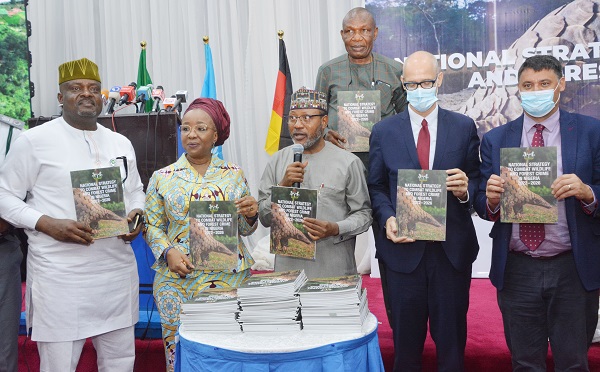
As part of its commitment to the Convention on International Trade in Endangered Species of Fauna and Flora (CITES), Nigeria has launched a National Strategy to Combat Wildlife and Forest Crime 2022-2026.
Speaking during the launch of the four-year strategic document prepared by the department of forestry under the Federal Ministry of Environment with technical support by the United Nations Office on Drugs and Crime (UNODC), funded by the government of Germany and other development partners, today (April 11, 2022) in Abuja, the Minister of Environment, Barr. Mohammed Abdullahi, said the goal of the document is to rid Nigeria of the menace of wildlife and forest crimes.
“The development of Nigerian National Strategy and Forest Crime is critical and timely. Today, Nigeria heeded the demand of the international community for well-structured guidelines, legislation and punishment for [poachers/killers of] wildlife and perpetrators of other related forest crimes. This requires enhancing institutional capacity, strengthening the legal frameworks, increasing collaboration and removing crime enablers, raising awareness of wildlife crime and designing alternative means of livelihood for dwellers in local communities,” he said.
Abdullahi assured that the ministry will provide all technical and necessary support for the implementation of the national strategy, adding that Nigeria will not relent as she continues to collaborate with partners and stakeholders at the national and regional levels in the thematic areas of the fight against illegal wildlife and forest trade through the mechanisms of investigation, enforcement, prosecution and stockpile management.
Earlier, the Minister of State for Environment, Barr. Sharon Ikeazor, lamented that Nigeria’s rich biodiversity ranging from aquatic, terrestrial fauna and flora is under serious, multiple threats of being lost irredeemably.
According to her, wildlife and forest crime – the illegal taking, trading, harvesting, processing, killing, possessing and consumption of wild fauna and flora in all its habitat range – has been a big challenge in the conservation of biodiversity within the nation’s boundaries in recent years.
She, however, pointed out that the national strategy is aimed at tackling wildlife and forest crime as well as achieving sustainable forests management that will also address climate change.
“It is an embodiment of all that is needed to reverse the negative trend of social, political and economic impacts of wildlife crime in Nigeria. With the well spelt-out, strategic goals and objectives, coupled with implementation coordination and implementation framework, the document has the potential to facilitate a reduction in the rate of wildlife and forest crime in Nigeria,” she maintained.
Ikeazor called for the effective implementation of the strategy, even as she harped on the need to explore diplomatic channels by engaging the embassies of key European and Asian countries noted as destinations for trafficked products, to assuage the demand pressure.
“The existing strong collaborative partnerships with United Nations Office for Drug and Crime (UNODC), United States Agency for International Development (USAID), the German government, Born Free America, Environmental Investigation Agency (EIA) and Africa Nature Investors (ANI), among others, have directly enhanced capacity of the frontline officers of the Nigerian Customs Service (NCS), Nigeria Agricultural Quarantine Service, Economic and Financial Crimes Commission, Nigeria Financial Intelligence Unit, InterPol, judges of the Federal High Court and other relevant partners. The partnerships have catalysed the achievement of results that we have started seeing in recent times,” she added.
In his introductory remarks, the representative, UNODC country office, Nigeria, Mr. Oliver Stolpe, described the strategy as “exemplary not only in content and focus but also in the highly participatory” way it was developed.
“Under the overall coordination of the Federal Ministry of Environment, a highly diverse group of stakeholders including key law enforcement agencies such as the Nigeria Customs Service, EFCC, NESREA and the National Parks Service, the Federal Ministry of Justice, Nigeria Financial Intelligence Unit, the Nigerian Ports Authority, the Federal Airports Authority of Nigeria and the Federal Ministry of Transportation, several relevant professional and trade associations, academia, civil society organisations and international development partners, worked diligently for more than a year. I do not doubt in my mind that this well-calibrated framework will enable all stakeholders involved in better coordinating their efforts towards greater impact and, ultimately, better protection of Nigeria’s wildlife and forests,” he said.
Stolpe urged the ministry to move quickly towards formalizing the coordination and implementation framework of the strategy, stressing it is critical to ensure that the implementation plan for the strategy is costed ahead of the 2023 budget submission cycle so that funding can be allocated for its implementation.
“In commencing the implementation of the strategy, it is important to highlight some of the top priorities which should receive immediate attention. They include the criminal justice response to wildlife trafficking; the review of the relevant legislation, particularly in terms of penalties imposed as well as clarifying and deconflicting the mandates of different agencies tasked to prevent as well as to investigate and prosecute wildlife and forest crimes so we can mount a credible deterrence for these crimes,” he emphasised.
In his remarks, the economic chief, United States Embassy, Abuja, Ian Sheridan, stressed the need to conserve the diversity of life on this plant to support the ecosystem.
He posited that wildlife trafficking and forest crimes facilitate corruption, deprives communities of livelihoods and contribute to the spread of disease. He added that the United States is supporting the investigation and prosecution of wildlife crime in Nigeria and has trained prosecutors and judges, and government agencies, NESREA, EFCC and others to enhance investigations and inter-agency information sharing.
“We see promise in this new national strategy to develop a culture of enforcement not just for the big shipments that make the headlines but for the everyday trafficking of wildlife we see in the market and online,” he added.


